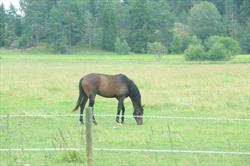Bob Judd, DVM, DABVP (Equine Medicine), DABVP (Canine and Feline Practice)
DSC_9487 (3).JPG

Exertional rhabdomyolysis syndrome is the breakdown of muscle in the horse as a result of a sudden increase in intense exercise. Referred to as “tying up’, it causes muscle stiffness, can cause severe muscle damage, and can even lead to kidney damage.
Feeding the correct diet can help prevent the syndrome.
It can be a single occurrence or can occur as a chronic syndrome. Dr. Jennifer Madera, DVM, writes in The Horse that sporadic episodes occur with overwork, especially in hot and humid weather.
Horses with the chronic form of the syndrome have hereditary conditions that lead to tying up. A muscle biopsy or a blood test is required to make this diagnosis.
Nutrition can help prevent the sporadic form of tying up. The basis of the diet should be good quality hay and pasture. Your horse should be fed 1.5 to 2% of their body weight in hay or grass daily, which is 15-20 pounds for a 1000-pound horse, depending on your horse’s condition. Forage holds water in the gastrointestinal tract, which can help with dehydration during exercise.
Feeding straight alfalfa is discouraged because it supplies high calcium levels, which can lead to metabolic imbalances and excess protein that requires the kidneys to work harder.
Dr. Meg Sleeper, VMD, Dipl., ACVIM, believes in the importance of testing the nutrient content of the pasture and hay you provide to your horse. However, forage alone generally does not provide enough energy for horses participating in athletic events, and added concentrates like grain or pellets are required.
It is important to feed only moderate levels of non-structural carbohydrates and a fat supplement for energy. Too much grain can lead to an increased risk of tying up due to the high levels of carbohydrates.
Supplementing your athletic horse with vitamin E as an antioxidant is also a good idea.